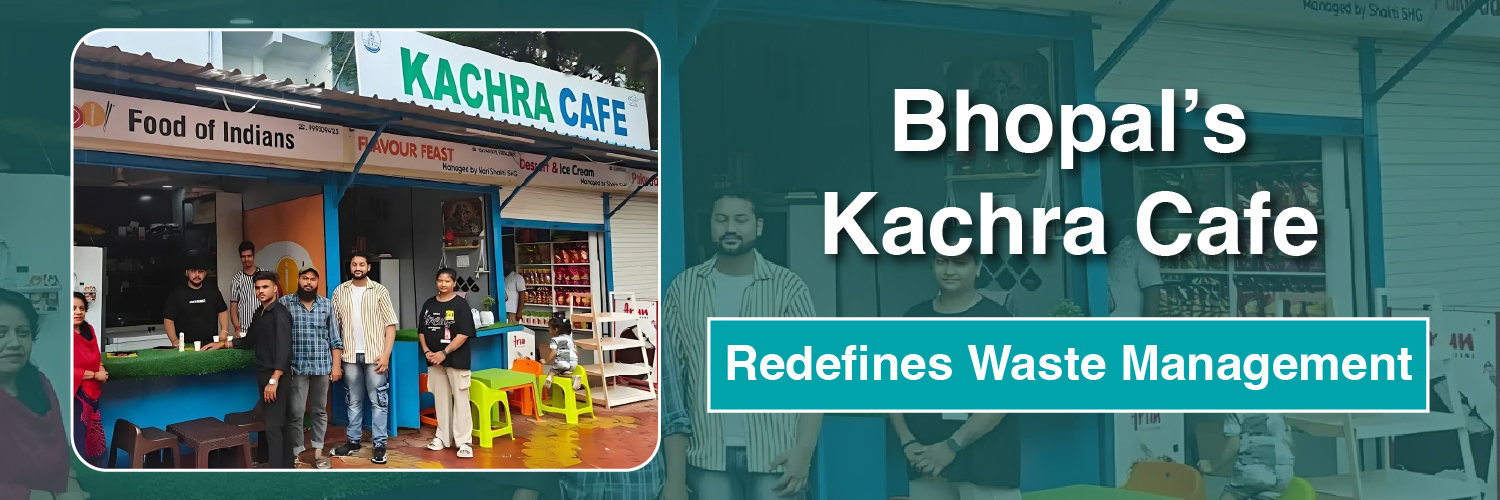
Under Swachh Bharat Mission Urban’s push for circularity and sustainable living, Bhopal’s first Kachra Cafe is transforming household waste into meals, eco-friendly products, and livelihoods. With 2,200 kg of waste collected, 765 participants, and support for 25 women’s self-help groups, it stands as a model of environmental responsibility, community engagement, and social empowerment.
In a world where urban waste is quickly becoming one of the biggest challenges to sustainable living, the city of Bhopal has set a remarkable example for the nation. The Bhopal Municipal Corporation has launched city’s first Kachra Cafe, a unique waste-to-resource initiative that transforms household waste into nutritious meals, eco-friendly products, and livelihood opportunities. More than just a recycling point, the Cafe has become a symbol of environmental responsibility, social empowerment, and community pride.
As per J&K Housing and Urban Development Department, the initiative was driven by a well-structured action plan and executed through seamless coordination among Swachhata Executives, TULIP interns, and volunteers deployed across lodgement centres, langar sites, and Yatra camps. These personnel promoted waste segregation, discouraged single-use plastics, and spread awareness about sanitation and hygiene. Real-time feedback on sanitation facilities was gathered through QR-coded toilets, while robust waste management systems and extensive awareness campaigns further encouraged pilgrims to maintain cleanliness and dispose of waste responsibly.

Kachra Cafe is founded on the mantra of: segregated waste is a valuable resource. The cafe provides a public platform where residents can deposit their segregated household waste and, in return, receive coupons or “Kachra Coins.” These can be redeemed for fresh food, beverages, and eco-friendly products, including cloth bags, compost, and handicrafts produced by women’s self-help groups. This initiative not only diverts substantial waste from landfills but also promotes the practice of daily waste segregation. To date, a total of 2,200 kg of waste has been collected and exchanged, including 270 kg of plastic.

The first Kachra Cafe was set up at 10 No. Market Zone in Bhopal. Encouraged by its success, two more cafes were opened at the Boat Club and Bittan Market Sabji Mandi. Citizens contribute newspapers, plastics, e-waste, clothes, metals, and other materials, which are weighed, segregated, and processed by trained staff. Recyclables go to authorized recyclers, reusable items for upcycling, and value-added products to self-help groups. So far, 765 people have registered as regular waste contributors. A key strength of the initiative is its integration with technology. A specially developed mobile application tracks the flow of waste and rewards, recording contributor details, monitoring coupons issued and redeemed, and generating real-time data on the volume of waste diverted. This digital backbone not only ensures transparency but also creates a model that can be scaled and replicated across other cities.

Kachra Cafe has become a platform for women’s empowerment by supporting 25 self-help groups. Collectives like Akansha, Nari Shakti, and Samriddhi showcase and sell pickles, papad, spices, crafts, and eco-friendly goods. The cafe thus serves as both an environmental initiative and a socio-economic movement, creating dignified livelihood opportunities for women.
The impact of the initiative extends far beyond recycling. Kachra Cafe functions as a center for environmental education, sensitizing citizens, especially the younger generation, about the importance of segregation at source, the reduction of single-use plastics, and the principles of reduce, reuse, and recycle. More than 1,500 visitors have engaged with the cafe to learn about the concept of sustainability.

In a short time, Kachra Cafe has succeeded in diverting significant amounts of waste away from landfills, reducing plastic consumption, and reinforcing a culture of cleanliness and civic responsibility. It has also provided income generation for self-help groups, dignity for informal waste workers, and greater community ownership of the city’s sanitation goals. With three functional centers already running successfully, the model holds immense potential for expansion across other wards of Bhopal and replication in urban municipalities across India.
For regular updates, please follow the Swachh Bharat Mission’s official website and social media properties:
Website: https://sbmurban.org/
Facebook : Swachh Bharat Mission - Urban | X: @SwachhBharatGov
Instagram: sbm_urban | Youtube: Swachh Bharat Urban | LinkedIn: swachh-bharat-urban